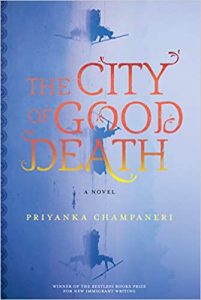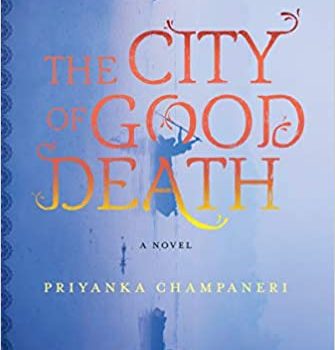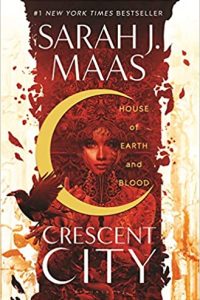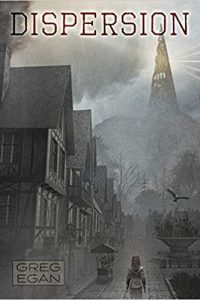Ian Mond Reviews The City of Good Death by Priyanka Champaneri
 The City of Good Death, Priyanka Champaneri (Restless Books 978-1-632-06252-9, $28.00, 448pp, hc) February 2021.
The City of Good Death, Priyanka Champaneri (Restless Books 978-1-632-06252-9, $28.00, 448pp, hc) February 2021.
Priyanka Champaneri’s debut, The City of Good Death, winner of the 2018 Restless Book Prize for New Immigrant Writing, explores the rituals and customs of death from a non-Western perspective. The story is set in the holy city of Banaras, also known as Kashi, on the banks of the River Ganges, where the Hindu faithful come to die on the promise they will be freed from the cycle of birth and rebirth. For the last decade, Pramesh Prasad has managed the city’s Shankarbhavan, a death hostel where he, along with his wife Shobha, his assistant Mohan, and the priests, led by Narinder, provide care and attention to the dying and their families. When Pramesh’s estranged cousin and childhood friend, Sagar, is drowned in the Ganges, Pramesh is forced to reckon with his past and why he left his cousin to deal with their abusive fathers. He also must contend with an entity that has taken up residence in the hostel’s washroom, a presence that makes a racket each night, and seems unwilling to allow those in the Shankarbhavan to die.
Champaneri effectively immerses the reader in the tastes, sounds and sacred rituals of Kashi:
Men bobbed in the water [of the Ganges], dunking themselves once, twice, holding their noses closed with one hand while the other directed the holy river over heads, arms, bellies…. The ghaatiye – priests who sat on the snug platform with large umbrellas fanning behind them like cobra hoods – collected coins from the bathers, passed a cracked mirror to one man, said a blessing for another, listened to the dilemma of a third…. Four men shouldering a bier navigated tight corners and crowded alleys… their voices, frozen in a monotone chant, echoed in the lanes. Rama Nam Satya Hai. Rama Nam Satya Hai. Rama is truth. God is truth.
What stands out – of which a taste can be found in the section quoted above – is Champaneri’s depiction of the Hindu rituals and traditions that surround the final days of a person’s life. As a Jew, I’m aware that the watered-down Western (Christian) conception of death that proliferates popular culture has little relevance for the world’s non-Christian population (including myself). While I’m aware that Hindu customs and funeral rites differ between the sects – just like they do across the Jewish faith – Champaneri’s depiction of these rites, particularly the strict adherence to rules such as those tacked up in the Shankarbhavan describing what a “family must do as soon as death visit[s] them,” deeply resonated with me, recalling the laws (of which there are many) that govern Jewish bereavement.
A key tenet of the Hindu faith is moksha, the liberation of the soul from the endless cycle of death and rebirth. The struggle to attain moksha is evident in Pramesh’s reluctance to face his childhood trauma and free himself from the guilt of leaving his cousin to deal with their abusive and alcoholic fathers. It’s also apparent in the rumour and innuendo that dogs a person’s life (most notably women), such as Sagar’s wife Kamna, viewed by those who barely know her as a wanton woman. Throughout the novel, Champaneri illustrates that moksha is not something you can achieve on your own; it requires the assistance and compassion of others. We see this in how Pramesh, Mohan, and the priests show an abundance of kindness toward the dying individuals in their care, and we see it in the young man who stays for months with his dying grandfather, even after the rest of his family have left for home. Pramesh, though, is unable to apply this truth, the willingness to embrace the help offered by his family and associates, to his current situation, his deep sense of guilt and grief. It takes the wonderful Shobha (with help from Mohan and the delightful Mrs. Mistry) to take matters into her own hands and compel Pramesh to make the painful journey back home. The final third of the novel becomes a glorious, moving testament to moksha, to liberating the soul from the burdens of the past.
The City of Good Death not only showcases Champaneri’s cultural background, but it also forefronts the manner in which family can both hurt and heal that is both deeply spiritual and emotionally satisfying.
This review and more like it in the May 2021 issue of Locus.
 While you are here, please take a moment to support Locus with a one-time or recurring donation. We rely on reader donations to keep the magazine and site going, and would like to keep the site paywall free, but WE NEED YOUR FINANCIAL SUPPORT to continue quality coverage of the science fiction and fantasy field.
While you are here, please take a moment to support Locus with a one-time or recurring donation. We rely on reader donations to keep the magazine and site going, and would like to keep the site paywall free, but WE NEED YOUR FINANCIAL SUPPORT to continue quality coverage of the science fiction and fantasy field.
©Locus Magazine. Copyrighted material may not be republished without permission of LSFF.








